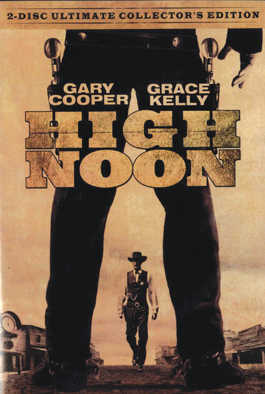home | metro santa cruz index | movies | current reviews | film review

DVD Reviews
High Noon: Ultimate Collector's Edition; two discs; Lionsgate; $19.98
The clock is ticking. Ramrod-righteous Marshal Will Kane (Gary Cooper) of the old West, faced with the choice of domestic bliss with his beautiful young Quaker bride (Grace Kelly in her first feature) or near-certain death at the hands of a vengeance-hungry gunman and his minions, does what a man's gotta do. The 1952 classic Western, directed by Fred Zinnemann and produced by Stanley Kramer, is one of those films that serves as a tabula rasa for social metaphors (like Fatal Attraction). Cooper's marshal appeals to the better natures of his friends, deputies and townspeople only to expose their most cowardly impulses. Without allies, Kane must uphold law and order alone. That image certainly appeals to conservatives then (it's the United States alone vs. communism) and now (it's the United States alone vs. terrorists, with a gutless United Nations). But as seen in one of several extras in this collector's edition, any president, for instance interviewee Bill Clinton, appreciates the notion that a great leader is always essentially alone. More interestingly, High Noon was made at the height of the McCarthy era, and some observers saw Marshal Kane as a Hollywood victim of red-baiting and blacklisting. Indeed, screenwriter Carl Foreman was hauled before HUAC, and Cooper, quite courageously, defended him. As a film, and not a metaphor, High Noon benefits from the high-contrast photography by Floyd Crosby; the relentless score by Dimitri Tiomkin, a surprising role for Katy Jurado as the Mexican woman who loves Kane and seems to be bankrolling most of the town's businesses, and a rogue's gallery of supporting players: Lon Chaney Jr., Lloyd Bridges, Otto Kruger, Lee Van Cleef and Jack Elam. In 1968, Elam turned up in Sergio Leone's Once Upon a Time in the West, whose opening scene of outlaws waiting for a train must have been influenced by the similar dynamic in High Noon. This set includes an unusually rich set of fascinating interviews.
(Michael S. Gant)
Quantum Hoops; one disc; Green Forest Films; $24.95
The California Institute of Technology is famous for its brains, having nurtured some of the world's most brilliant scientific minds. But as can be expected in a school that has always preferred the eggheads over the jocks, Caltech's sports program, if you can call it that, is sufficiently wanting in brawn. In fact, the Caltech Beavers basketball team hasn't won a single game in two decades. First-time director Rick Greenwald chronicles the team's 2006 season in the documentary Quantum Hoops. With more high school valedictorians on the team than players with previous basketball experience, Caltech has consecutively lost more than 243 games. The ultimate underdog story, this warmhearted film follows the Beavers in their quest to win a single game. Quantum Hoops could have easily turned the struggle of these young players into a sports-blooper reel: a bunch of pencil-neck geeks falling down and missing free throws. Instead, narrated by a sincere, if rather unexcited-sounding, David Duchovny, the documentary manages to stay decidedly buoyant and genially humorous. However heartfelt, Quantum Hoops does seem padded. Greenwald, who spends his day job as a reality-TV editor, originally intended this to be a short. A self-professed sports fanatic, Greenwald spends much of Quantum Hoops in iMovie-esque montages of team pictures and historical black-and-white photo collages. Diving into the Beavers' illustrious athletic past, Greenwald clearly found the minutiae of Caltech historical details more exciting then a general audience ever will. The film is at its most compelling when following the daily lives of the hardworking, academically brilliant 2006 team. On a squad where almost the entire lineup earned perfect math scores on their SATs, these young men obviously play because they love the sport and the team, not because they have to.
(Jessica Fromm)
Da Vinci's Inquest: Season 3; four discs; Acorn Media; $59.99
Before there was CSI, there was the Canadian forensics series Da Vinci's Inquest, which ran from 1998 to 2005. Nicholas Campbell (a frequent presence in David Cronenberg movies) plays Dominic Da Vinci, a Vancouver coroner who rubs both superiors and suspects the wrong way with his politely annoying manner as he tries to unravel a new murder or two each week (the season is 13 episodes long). As in CSI, the stories are ensemble-based, with multiple cases being investigated by a large cast of coroners and police, who often spend time quibbling among themselves or interoffice dating. Da Vinci's own estranged wife is a doctor in the department, which adds some emotional tension. Among the familiar faces are Ian Tracey (Intelligence, one memorable episode of The X-Files) and Donnelly Rhodes (Dr. Cottle on Battlestar Galactica) as a young cop/old cop team. If this season is representative, the show doesn't bother with the anatomy-cam and gross-out dissections of the American CSI franchise. The structure of most of the episodes--in which murders are frequently unsolved and plot lines unresolved--can be frustrating after a while. Just around the 40-minute mark, when you know that story is wrapping up, you find yourself thinking that there are way too many loose ends that can't be tied up in time, and sure enough, they aren't. Extras include production footages and a profile of Christ Haddock, who created the show.
(Michael S. Gant)
Send a letter to the editor about this story.
|
|
|
|
|
|